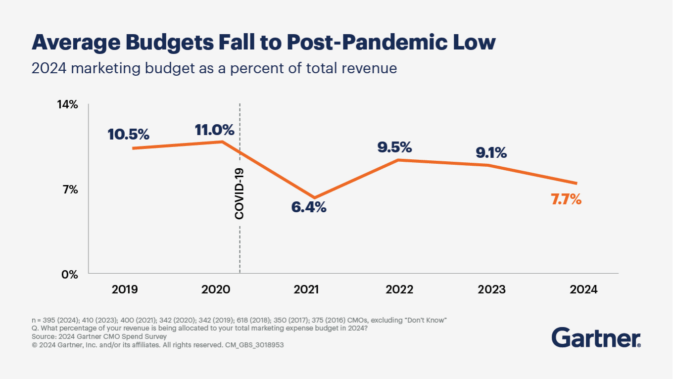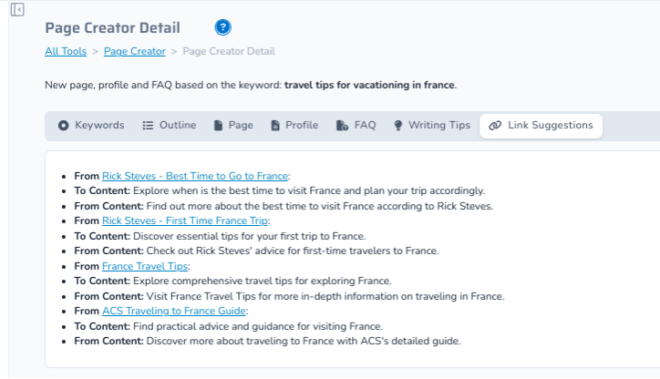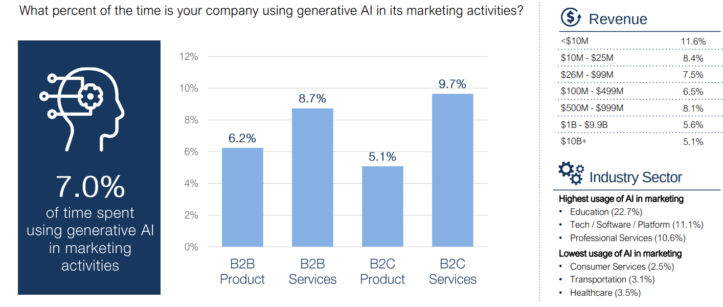Using AI to Supercharge Your SEO Content Initiatives

Over 90% of online experiences start in the search bar of a search engine, so the significance of SEO is impossible to overstate. Still, search engine optimization projects and initiatives routinely flop due to a lack of effort — many businesses simply don’t do the work.
One of the biggest hurdles standing in the way of SEO success is putting out enough valuable content to stand out.
Content creation is among the top challenges in SEO — a common bottleneck that stalls progress. Falling short of the demands surrounding content creation can spell trouble, even when you have a well-built SEO strategy.
Below, I’ll share how you can use AI for content to overcome obstacles keeping you from achieving your SEO goals.
- The Challenges of Content Creation in SEO
- AI as a Collaborative Partner
- Best Practices for Incorporating AI into Your SEO Content Workflow
- Final Thoughts
- FAQ: How can I use AI in SEO Content Creation to improve my content strategy and efficiency?
The Challenges of Content Creation in SEO
Of the myriad of functions the average business handles, content creation is one of the hardest to get right. In the context of SEO, it requires you to truly connect with your target audience and appease search engines at the same time.
Let’s look into five stumbling blocks that often thwart content strategies, resulting in stalled projects and unmet SEO goals.
1. Time and Resource Constraints
Creating top-quality content demands lots of time and resources — two things most companies just don’t have.
Chances are you already know you need solid writing chops to create well-researched, interesting and optimized content. But that’s not all. On top of that, crafting such content involves research, planning, drafting, editing and SEO optimization.
Each step takes substantial time and various types of resources, all of which add up as you scale up content production. The process can be incredibly overwhelming.
When companies have few or limited resources, these issues are that much more difficult. The bulk of businesses haven’t hired or contracted personnel to head up content creation and SEO, so they juggle these roles themselves. Because of this strain, these companies have trouble on two fronts — creating top-notch content and publishing enough of said content on a consistent schedule.
The result? An SEO strategy that lacks the content fuel needed to drive it forward.
2. Creativity Fatigue
Even the most skilled marketers can encounter creativity fatigue. Against the never-ending pressure to produce good content, these professionals can quickly run out of ideas.
I often see this in industries where content topics can get redundant; it’s hard to reimagine and approach topics from new angles to keep your audience wanting more.
As creativity wanes, the content itself can suffer — becoming generic, uninspired or nearly identical to what’s already out there. This tanks reader engagement as well as SEO effectiveness.
Overworked, creativity-starved content creators aren’t at their best. They’ll find it difficult to provide content that meets the quality and originality standards necessary to keep both audiences and search engines interested.
3. Scaling Content Production
Scaling content production is another SEO function that can be problematic, especially in the case of smaller teams or businesses aiming to expand their online presence.
As content demand continually grows, it becomes even more critical to balance quality and quantity.
Transitioning from producing a handful of content pieces per month to managing an extensive content calendar can strain any business. The increased workload requires additional hands and an efficient process — that is, if you don’t want to sacrifice quality.
Without adequate infrastructure and resources in place, any attempts at scaling can result in inconsistency, missed deadlines and reduced content quality — all of which can negatively impact SEO performance.
4. SEO Complexity
Producing content for both humans and search engines is an intricate balancing act.
SEO requires you to pay careful attention to various details — keyword integration, meta descriptions, alt tags, internal linking and readability are among them. Each piece should meet these technical requirements while still providing value to the audience.
5. Waning Budgets
Gartner reports that many businesses do not allocate a marketing budget at all. Average budgets have decreased from 9.1% of revenues in 2023 to 7.7% of company revenues by 2024 on average.

AI as a Collaborative Partner
Now let’s look at how AI serves as a solution to common obstacles in SEO content creation.
1. Alleviating Time and Resource Constraints
AI-driven content creation tools, including content generators and research assistants, make content creation easy by taking tedious and lengthy tasks off of businesses’ plates.
For example, AI can do a lightning-fast analysis of a topic, come up with a list of relevant keywords and draft detailed initial content outlines. With all of this work done for them, human creators are free to focus on the strategic aspects of content creation, like message refinement and alignment with the brand’s identity and target audience.
When utilized as a collaborative tool, AI helps brands publish on a consistent schedule without any negative impacts to quality, even when resources are hard to come by.
2. Combating Creativity Fatigue
AI combats creativity fatigue by providing inspiration and new perspectives. AI-driven tools deliver enlightening insights that help to spark new content ideas and angles.
On top of that, AI-powered writing assistants can suggest alternative phrasings, structures or even entire paragraphs. Features like these eliminate writer’s block and add a creative edge to blogs, website copy and other content that might have come out stale.
3. Scaling Content Production with AI
AI-powered content generation tools can produce a first draft of text in minutes. Human editors can then refine these drafts in less time than creating a first draft on their own in many cases.
Plus, since AI can automate various parts of the content creation process — like keyword research, content structuring and even proofing — businesses can use their human resources for tasks that are more strategic in nature.
This is valuable for businesses looking to expand their SEO program.
4. Simplifying SEO Complexity
AI tools can perform real-time content analysis and suggest quality improvements, keyword placement and links.
For example, our AI-powered writing assistant, PreWriter.ai, gives keyword suggestions for topics, internal and external link suggestions and more.

This allows businesses to focus on crafting valuable content for their audience while AI assists in suggesting foundational optimization tactics.
5. Optimizing Budgets in a Tight Economy
Considering the ever-shrinking marketing budget, there’s ample room for cost-effective solutions that boost ROI – AI is a big one.
Gartner states, “CMOs are consistently asked to ‘do more with less.’ And AI is turbocharging transformation, turning technology from an enabler of marketing work into yet another disruption poised to challenge marketing’s value proposition.”
Companies devote anywhere between 5%-12% of their marketing activities to using AI for marketing activities. When properly implemented and utilized, AI allows once stagnant SEO projects to gain steam so businesses remain competitive in today’s economy.

Best Practices for Incorporating AI into Your SEO Content Workflow
Incorporating AI into your content creation process can enhance efficiency and help SEO programs move forward faster. But it’s important to approach this integration thoughtfully.
Here are some best practices to ensure that AI becomes a valuable addition to your workflow:
Start Small
When introducing AI into your content creation workflow, starting with one or two tools is wise. This allows you to test how AI fits into your existing processes — and deep dive into the tools — without overwhelming your team.
For example, you might begin with an AI tool that generates content ideas, outlines and text to edit, and then one that helps proof your content.
As you become more comfortable with these tools and see their benefits, you can gradually scale up and integrate more AI solutions into different stages of your content creation process.
Maintain Quality Control
AI can handle many aspects of content creation, yet human oversight must always remain part of this process. Although they are powerful, AI tools lack the nuance and understanding that humans bring.
Always ensure that any content produced or modified using AI undergoes human review in order to maintain quality, tone and accuracy in your writing.
AI should enhance, not replace the human touch that makes content distinctive and captivating.
Balance AI and Creativity
Although AI can offer valuable insights and automate certain tasks, to achieve the biggest impact, you need human creativity.
AI may suggest topics, draft content and optimize for SEO, but the real magic happens with human input. Creative input from your team ensures that any message created resonates effectively with its intended target audience.
Encourage your team to look at AI as a tool that enhances their creative process instead of a solution that dictates it.
Final Thoughts
Effective SEO is at the center of search engine visibility and business expansion. AI-powered writing assistance is a game-changer that addresses the common challenges of SEO content creation.
But the key to success lies in thoughtful integration. By embracing AI as a collaborative partner, you can transform your SEO efforts, overcome obstacles and drive growth in your online presence.
Looking to supercharge your content development? PreWriter.ai can streamline your workflow and help you keep up with the demand for quality content output. Sign up for PreWriter today and try out the tools for free.
FAQ: How can I use AI in SEO Content Creation to improve my content strategy and efficiency?
Numerous fields have been transformed by AI; in the SEO content creation sphere, it gave businesses and individuals the opportunity to perfect their strategies and simplify their workflows. Injecting AI’s capabilities into your content production process heightens your content’s relevance, engagement, and fitness for search engines.
AI-powered tools are able to evaluate gigantic volumes of data, generate insights and give you pointers to better your content in meaningful ways.
AI can easily execute cyclic, time-consuming tasks – for content creators and businesses, this is a real game-changer. AI-enabled tools can automate keyword research by swiftly pinpointing relevant keyword terms and phrases based on search intent and monthly search volume. This function makes it easier to align your content with what searchers are looking for.
In addition, AI and perform topic modeling to illuminate content gaps and give you topic ideas your target audience will connect with. Cashing in on these AI capabilities allows you to shift your focus off of distracting repetitive tasks and hone in on producing distinctive, top-quality content.
Content optimization is yet another role AI can handle. Popular content tools like SurferSEO, Clearscope, or our own PreWriter.ai use AI behind the scenes to scrutinize highly ranked pages and propose optimization tactics. They may help with suggestions surrounding content length, keyword placement, readability and more to help you ensure that your content is poised to rank well in the SERPs.
In addition to that, AI’s analytical capabilities can help you better understand searcher behavior. This enables you to more precisely target your audience and make meaningful content strategy adjustments centered on the most current data.
Putting out personalized content is a must if you’re going to attract today’s audiences. And AI can help in this regard. Its advanced technology can provide individualized recommendations gleaned from user data ranging from behavior patterns, preferences and demographics.
Such personalization opens the door to a more profound connection between you and your audience, more conversions and a better overall user experience.
Voice search optimization is growing in importance; AI supports this function by generating search queries relevant to the audience you’re hoping to attract. You can incorporate these queries into your content.
Continuous improvement is essential for growth, and content performance analysis is instrumental in this area. AI tools can track content performance over time, specifically the bounce rate, time on page and social shares. Insights like these go a long way in helping you figure out which tactics are working, and which aren’t.
You can use this information to make data-backed choices sure to bolster content strategy refinement. In addition to that, auditing tools with artificial intelligence capabilities can highlight content that may be underperforming or past its prime. It enables you to more easily align your content with the most current industry best practices.
Taking full advantage of AI in SEO content creation can unlock a serious efficiency boost for content creators and businesses. With AI doing a lot of the heavy lifting, there’ll be less manual work to do. So, your content teams can put out much more content in less time. AI can assist content producers quickly while assuring its high-quality, SEO-friendly nature.
Content producers often struggle to stay ahead in an ever-evolving SEO landscape, but that doesn’t need to be the case. Artificial Intelligence gives content producers an edge by quickly publishing relevant and competitive material at scale.
And the best part? You can do it all without diverting excessive resources from core creative tasks.
Step-by-Step Procedure
- Choose an SEO content creation tool like PreWriter.ai that aligns with your needs and preferences as a business or content creator.
- Install and integrate the tool with your content management system.
- Define your content goals and target audience to guide AI-driven insights.
- Use AI tools for comprehensive keyword research aligned with user intent.
- Generate topic ideas through AI-powered topic modeling to fill content gaps.
- Create a content outline using AI-based content structuring recommendations.
- Write initial drafts and input them into AI tools for optimization suggestions.
- Utilize AI to place keywords strategically within the content.
- Analyze top-ranking competitor pages with AI to refine your content strategy.
- Incorporate AI recommendations for improving readability and length.
- Optimize content for voice search by adding AI-suggested queries.
- Review AI-generated personalization recommendations to tailor content.
- Automate meta descriptions and title tags using AI tools.
- Use AI analytics to monitor content performance metrics continuously.
- Identify high-performing content and replicate its techniques and strategies.
- Update and refresh content based on AI-audited findings.
- Implement AI-driven adjustments to your content strategy in real time.
- Leverage AI-generated insights for creating engaging visuals and multimedia.
- Streamline your editorial calendar with AI-predicted publishing schedules.
- Train your team on AI tools to maximize content creation efficiency.
- Assess AI tool performance regularly to ensure alignment with your goals.
- Continually adapt to new AI advancements to maintain a competitive edge.
- Utilize AI to study different content variants and conduct A/B testing.
- Refine your AI usage strategies through scheduled reviews and feedback loops.
Successfully leveraging AI in SEO content creation is about much more than acquiring new tools. It’s about overhauling your approach to content strategy and efficiency. These sophisticated AI-powered techniques allow your team to create first-rate content on a continual basis while staying abreast of all things SEO. Few assets are more valuable.
26,000+ professionals, marketers and SEOs read the Bruce Clay Blog
Subscribe now for free to get:
- Expert SEO insights from the "Father of SEO."
- Proven SEO strategies to optimize website performance.
- SEO advice to earn more website traffic, higher search ranking and increased revenue.

5 Replies to “Using AI to Supercharge Your SEO Content Initiatives”
Great insights! AI truly transforms SEO content creation by easing resource constraints, inspiring fresh ideas, and simplifying complex SEO tasks. Leveraging AI tools allows teams to scale efficiently without compromising quality, maintain consistent publishing schedules, and overcome creativity fatigue — all while keeping content engaging for both audiences and search engines.
“AI is definitely a game-changer for SEO! From generating keyword-rich content faster to analyzing trends and optimizing for search engines, AI tools can give a huge boost to content strategies. It’s exciting to see how technology can streamline the process and improve rankings. Thanks for shedding light on how AI can take SEO initiatives to the next level!”
LEAVE A REPLY









